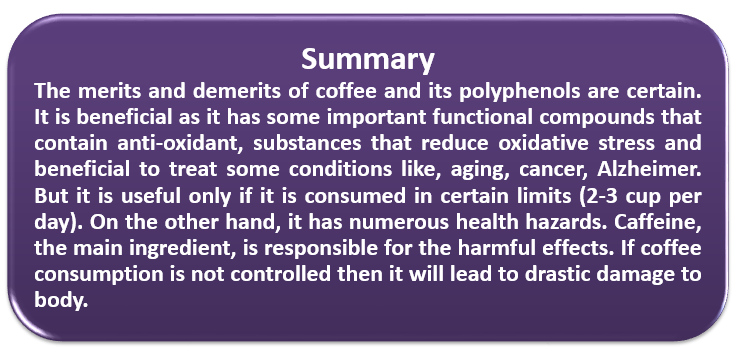
Is Coffee Good or Bad?
Introduction
Coffee, a drink made from coffee beans. Coffee contains more than 1000 plant-based chemical compounds that may be considered as functional compounds that include caffeine, chlorogenic acid, caffeic acid, kahweol, cafestol, ferulic acid, diterpenes, anti-oxidants.
Salient Health effects of Coffee
1. Hypertension
Coffee contain anti-oxidants, mainly chlorogenic acid, phenolic compounds, thus reducing the risk of cancer, aging, hypertension. According to some researches, high consumption of regular coffee has reduced the risk of hypertension in women by 26%.
2. Weight loss
Weight loss is an obsession for many individuals all around the world. Caffeine is often used as an ingredient in weight loss formulas. It is believed that due to the diuretic effect of caffeine, it causes water loss, not the fats which lead to weight reduction. Coffee consumption has negative effect on weight loss, so it is recommended to reduce the intake of coffee and other caffeinated beverages to 1-2 cup per day.
3. Neurodegenerative diseases
The major cause of Alzheimer’s disease and other neurodegenerative disease is cellular damage because of oxidative stress in the brain. Free radicals cause oxidative stress. Here, Chlorogenic acid plays its role by reducing oxidative stress and promoting brain health. Chlorogenic acid is renowned dietary polyphenols found in coffee.
4. Anti-cancerous effect
Chlorogenic acid in coffee exhibit chemopreventive properties, as it act as the inhibitor of microsomal glucose-6- phosphate translocase (G6PT). G6PT is an enzyme present in the Endoplasmic Reticulum. G6PT causes various health problems i.e. Type 2 Diabetes Mellitus, Glucogen Storage Disease, Tumour Cell Growth, Hypoxia.
5. Retina protection
Chlorogenic acids have some kind of retinoprotective effects, which means the chlorogenic acid is good for eyesight. It has different features i.e. lessens the apoptosis of retinal cells, decreases optic nerve crush, inhibits retinal blood barrier breakdown in retinopathy.
6. Cholesterol
Coffee consumption has been related with higher concentrations of serum total cholesterol and low density lipoprotein cholesterol. Generally, in coffee oil, two diterpenes are found, i.e. Cafestol and kahwoel. Diterpenes are responsible for the cholesterol-raising compounds in coffee, but paper filters mostly remove them. So the unfiltered coffee is a noteworthy source of diterpenes, on contrary, the intake of filtered coffee results in very little increase in serum cholesterol.
7. Diabetes
Coffee consumption heightens the risk factors of diabetes. Caffeine, the major active ingredient of coffee, interferes with the metabolism of glucose. Thus, triggering the glucagon activity and ultimately raises blood glucose level.
8. Pregnancy
Detoxification time for caffeine is longer in pregnancy. In the second and third trimester, the detoxification time for caffeine has become triple. Caffeine rapidly crosses the placental barrier and remains in the system of the developing fetus. As the liver is not fully developed, it will be difficult for the fetus to detoxify it. This may lead to birth defects, impaired fetal growth, and abortion. It is recommended to consume 300 mg per day of coffee.
9. Stress
Excessive coffee consumption aggravates the stress level in the body i.e. physical, mental, and emotional. According to Harvard research, stress is known to be a major factor for obesity. Coffee triggers the release of stress hormones, which leads to the raise of heartbeat.
10. Bone health
Caffeine, the principal component of coffee, reduces the absorption of several minerals, like calcium absorption from gastrointestinal tract is lowered. This heightens the risk of osteoporosis and other bone related issues. The coffee consumption limited to 2–3 cups per day along with adequate intake of calcium and vitamin D is recommended, which reduces the risk of osteoporosis and its related fractures, mainly in elderly women.
Keywords:
Coffee, caffeine, heath status and coffee, coffee and its functional compounds


